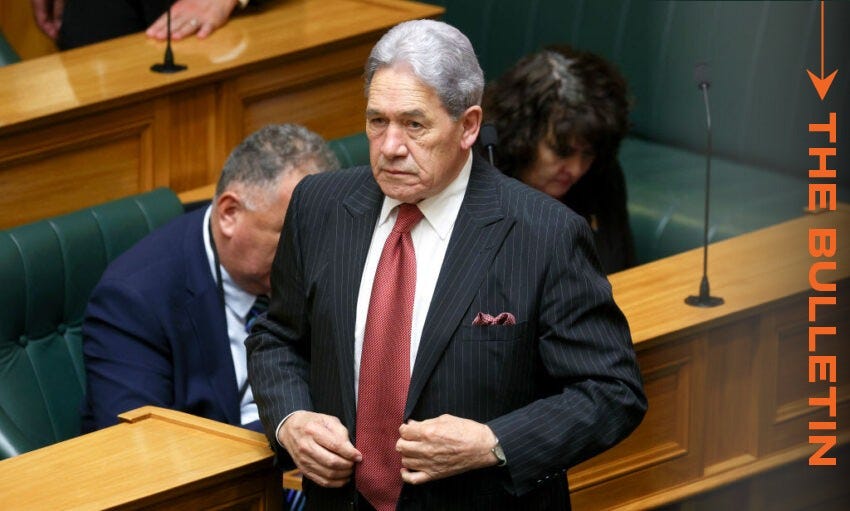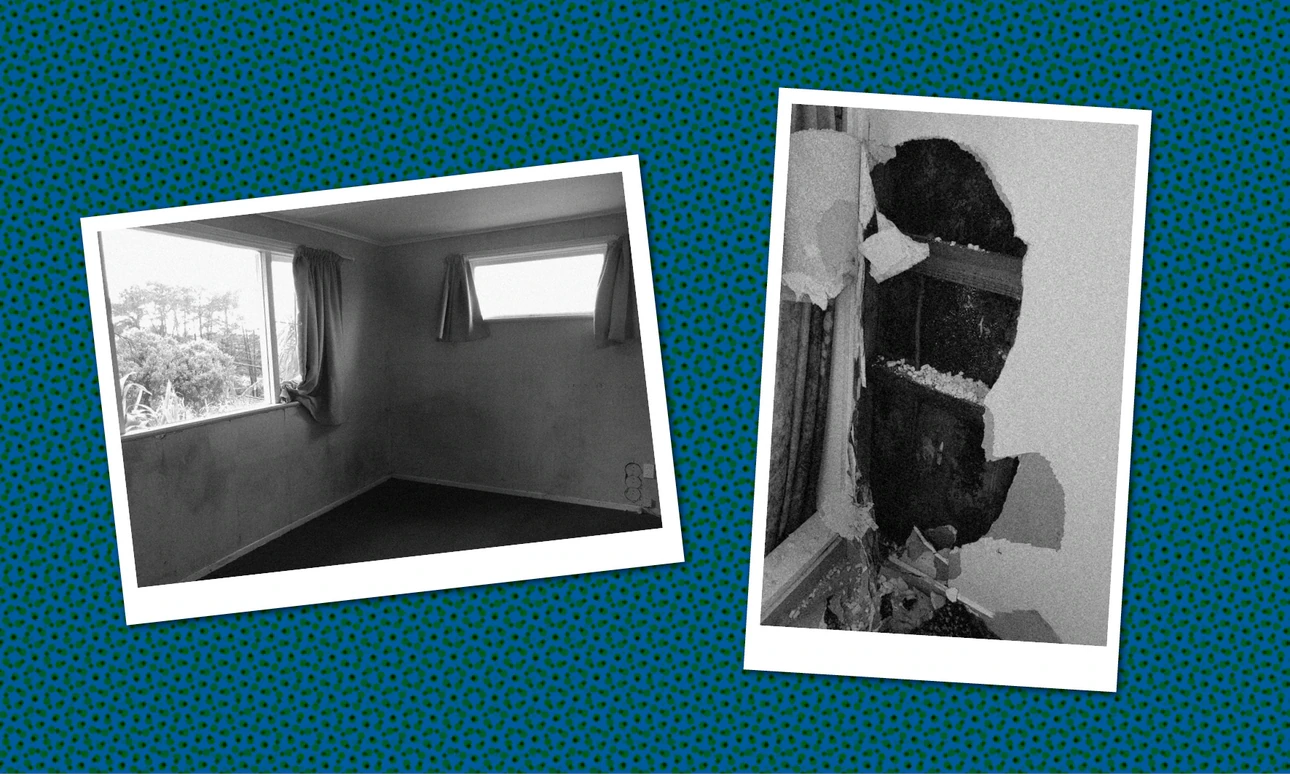Greyhound racing sprints toward the finish line
Some in the industry say a small number of negligent trainers 'buggered it' for everyone else.
Mōrena, and welcome to The Bulletin for Wednesday, December 11.
In today’s edition: We’re finally set to learn what the government has decided to do about the Interislander ferries, the latest climate plan shows the country isn’t on track to meet the third emissions budget, and we dive back into The Spinoff’s 2024 archive as we head toward the end of the year. But first, the greyhound industry learns its fate.
‘Protecting the welfare of racing dogs’
Let’s return to a topic we talked about way back in June given there has been a significant update from the government. I’m talking about greyhound racing, with Winston Peters confirming yesterday he would take long-awaited action to ban the sport in New Zealand. Investigative reporter Michael Morrah has been covering the issue for years, first for Newshub and now for the NZ Herald. As he reported, the decision by Peters to outlaw greyhound racing followed three critical reviews of the industry along with a number of reported injuries. “This is not a decision that is taken lightly but is ultimately driven by protecting the welfare of racing dogs,” Peters, a known dog lover, told media.
While the ban has been announced, it will take almost two years for it to come into effect in order to let the industry adjust to the change. Urgent legislation was also passed yesterday in parliament to try and prevent racing dogs being killed as a result of the impending ban. Thousands of dogs will need to be rehomed, too. The Herald’s Cherie Howie (paywalled) spoke to a greyhound adopter who said the dogs make great family pets. “They’re not damaged goods. They’re really loving dogs that are gonna need homes.”
A long time coming
We’ll get into the immediate response to the announcement shortly, but first, a little backstory. Peters has been contemplating this ban for sometime given cabinet was considering a move way back in May. It goes back a lot further than that, however. In 2017, a major report revealed more than 2,000 dogs had been injured, and 165 put down, directly due to racing over the previous three seasons. By 2021, the former Labour government had launched the third wide ranging review into the industry in a decade, putting it on notice. No decision was made before the last election despite a subsequent critical report by the Racing Integrity Board. And while Christopher Luxon was on the record during the election campaign as being in favour of a ban, the decision needed to go through Peters who had previously pledged to “clean the industry up” but never expressly spoken in favour of an outright ban. “[Luxon’s] got a minister now who knows more about it than he does, and I’m on the case, alright?“ Peters told reporters in March.
For those wondering whether action could be taken in the future on horse racing, another industry that has its own history of animal welfare concerns, that seems unlikely. Peters declared earlier this year that the industry needs to raise the stakes and get its "mojo" back, reported RNZ’s Felix Walton.
A few bad apples?
The greyhound industry, reported RNZ, said it had a lower rate of euthanasia on race days than the horse racing industry (Peters denied that horse racing was a more dangerous industry, speaking to Morning Report moments ago). "We believe that greyhound racing as an industry has taken huge, huge strides over the last two years and is leading the way in the racing industry from an animal welfare perspective, so the decision today is clearly very disappointing,” said Greyhound Racing New Zealand chief executive Edward Rennell. Peters acknowledged the progress made by the industry, but said it wasn’t enough. A legal challenge was “extremely remote”, reported the NBR (paywalled), meaning the decision announced yesterday seems unlikely to be wound back.
Writing for The Press, Charlie Mitchell looked at how Canterbury’s racing scene appears to have contributed to the sport’s demise, with a pattern of issues linked to the Addington race track including an uptick in injuries to dogs. A leading trainers in the region, Riley Evans, said a small number of negligent trainers had “buggered it for the rest of us”, reported The Post’s Brendon Egan. Another, Matt Roberts, agreed: “It’s devastating, especially when you know 95% of the trainers out here have been doing right by their dogs and there’s been a couple of rotten eggs who have ruined it for everyone”.
But animal welfare advocates said the writing had been on the wall for a long time, and the government made the right decision. “The sport is inherently dangerous… And whilst we appreciate the industry has made some improvements, it has completely lost its social licence,” the SPCA’s chief scientific officer Arnja Dale said, reported Stuff.
All eyes on us
In an opinion piece for the Herald, racing reporter Michael Guerin acknowledged that while the demise of greyhound racing was about the dogs, it was also about the people involved in the industry. “I feel for those greyhound people, some of them kind people who love animals and dogs more than anybody.”
Some will likely move overseas to continue their passion. You may be surprised to learn that New Zealand is currently one of just five nations to still have a greyhound racing industry. The other four are the UK, US, Australia and Ireland. It will be interesting, given those nation’s close ties to New Zealand, whether our decision sets a precedent. The decisions our government has grappled with are not unique. In the UK, reported the Vet Times in October, the government has suggested it could take action to address animal welfare concerns, but a wholesale ban was unlikely. Australia, too, is facing renewed calls to act almost a decade after an investigation exposed the preventable deaths thousands of young dogs a year and triggered a (later reversed) ban, as explained here by the BBC. Whether our government’s actions prompt other countries to take a look remains to be seen, but the rest of the world will be watching.
The future of The Spinoff depends on its audience
As many of you will have seen, we published an open letter outlining the financial situation we find ourselves in. Only 2% of our audience financially supports us. Doubling that number is our last, best shot at retaining the ability to carry on doing what we do. To those who have already supported, we thank you. If you can and haven't yet, please become a member or donate today.
Ferry d-day: Cost of new Cook Strait ships to be revealed
We’re finally set to learn what the government has decided to do about the Interislander ferries – though it appears the news has already made it out. ThreeNews’s Jenna Lynch reported last night that $900m has been set aside for the proposed Cook Strait ships, more than the $551m previously allocated by the Labour government. The ships will also be smaller and there’s a question over their rail capability. According to Lynch, Winston Peters will be given a new ministerial role with oversight over rail.
But while the cost of the ferries may be more than the previous “iRex” plan, which would have seen two new rail-enabled ferries, the overall cost is expected to be lower than the $3 billion that Labour was prepared to fork out after a budget blow out. That’s because of the cost of portside developments, with Lynch reporting that ports will fund as much of the landside infrastructure as possible – and should look to recoup those costs by passing them on to users. Labour has accused the government of spending more for less and said that, in the long run, costs would be driven up.
Best of 2024: I’ve been a Kāinga Ora tenant for 18 years – it’s no walk in the park
As we race towards the end of the year, it’s time to take a look back at some of the biggest and best Spinoff stories from 2024. This morning: a longtime Kāinga Ora tenant shares her experience. First published March 19.
One of the biggest pieces we published in March was this first person account from a Kāinga Ora tenant who was responding to a new move by the government to crackdown on residents who had fallen behind on rent. Here’s an extract:
The house I lived in was unpleasant. There was rot everywhere. I first noticed the dry rot just weeks after moving in with two little ones. The wooden post which held the lovely French doors that opened onto the deck was rotted through and the whole thing would sway out from the house, unattached, when I opened it. They removed it and installed a ranchslider but then the floor next to that started to rot.
I kind of just expected that they would look after their own property and investments. They did yearly inspections where they walked through and quickly eyeballed the place. I think they looked for holes in walls, missing doors, anything illegal and obvious signs of damage.
The Year in Review at Q Theatre in Auckland
After a sold-out night in Wellington, senior writer Anna Rawhiti-Connell will again take a running jump backward into the year’s biggest headlines, political dramas and Spinoff yarns at Q Theatre tonight. Award-winning writer and podcaster Dr Emma Wehipeihana and Spinoff alum Hayden Donnell will join her live on stage.
Come along for a night of easy laughs to wrap up this crazy year.
Click and Collect
Auckland Council opposes new housing because motorists won’t be able to see a hill.
The government’s new climate plan is out this morning, showing the country isn’t on track to meet the third emissions budget but is set to reach net zero in 2050. As Newsroom’s Marc Daalder explains, the plan relies on unproven methane-busting technology and partially disproven carbon capture schemes for as much as half of its promised greenhouse emissions reductions.
The latest 1News Verian poll shows more New Zealanders oppose than support the treaty principles bill, but an even larger group don’t know enough about the proposed law.
The government is moving to open up Sundays and public holidays for advertising on traditional media outlets.
Four MPs referred to Privileges Committee over parliament haka.
Millions of dollars collected from ratepayers to help rebuild the Christ Church Cathedral can be spent on reducing the city’s rates burden, councillors have been told.
I’ve been following the SolarZero story and yesterday’s episode of The Detail provides a good overview of what has been going on.
ICYMI: Here are the shortlisted candidates for Time Person of the Year 2024 (yes, Trump is in the running again – and so is Joe Rogan).
Hollywood returned to Hobbiton for the premiere of the new animated Lord of the Rings adaptation.
Alex Casey takes a look back at the long history of Aotearoa’s child stars shining on the world stage and asks: are they our greatest export? Books editor Claire Mabey and a panel of experts pick the best local reads of 2024. Liam Rātana reviews Ram Raid Mums which provides a powerful counter to the government’s punitive approach to crime. Madeleine Chapman and Hera Lindsay Bird offer a close reading of the United Healthcare CEO suspect Luigi Mangione’s Goodreads account. Alex Casey talks to the owners of some of the country’s smallest cinemas about how they’re surviving – and even thriving – in 2024. And for the cost of being: A thrifty apprentice who’s saving up to travel.
That’s it for another day. Thanks for reading and see you back here tomorrow.
Want to get in touch? Join the conversation in the Substack comments section below or via email at thebulletin@thespinoff.co.nz if you have any feedback on today’s top stories (or anything else in the news).
If you liked what you read today, share The Bulletin with friends, family and colleagues.


















Oh no - will more people now leave NZ for Oz, taking their greyhounds with them?